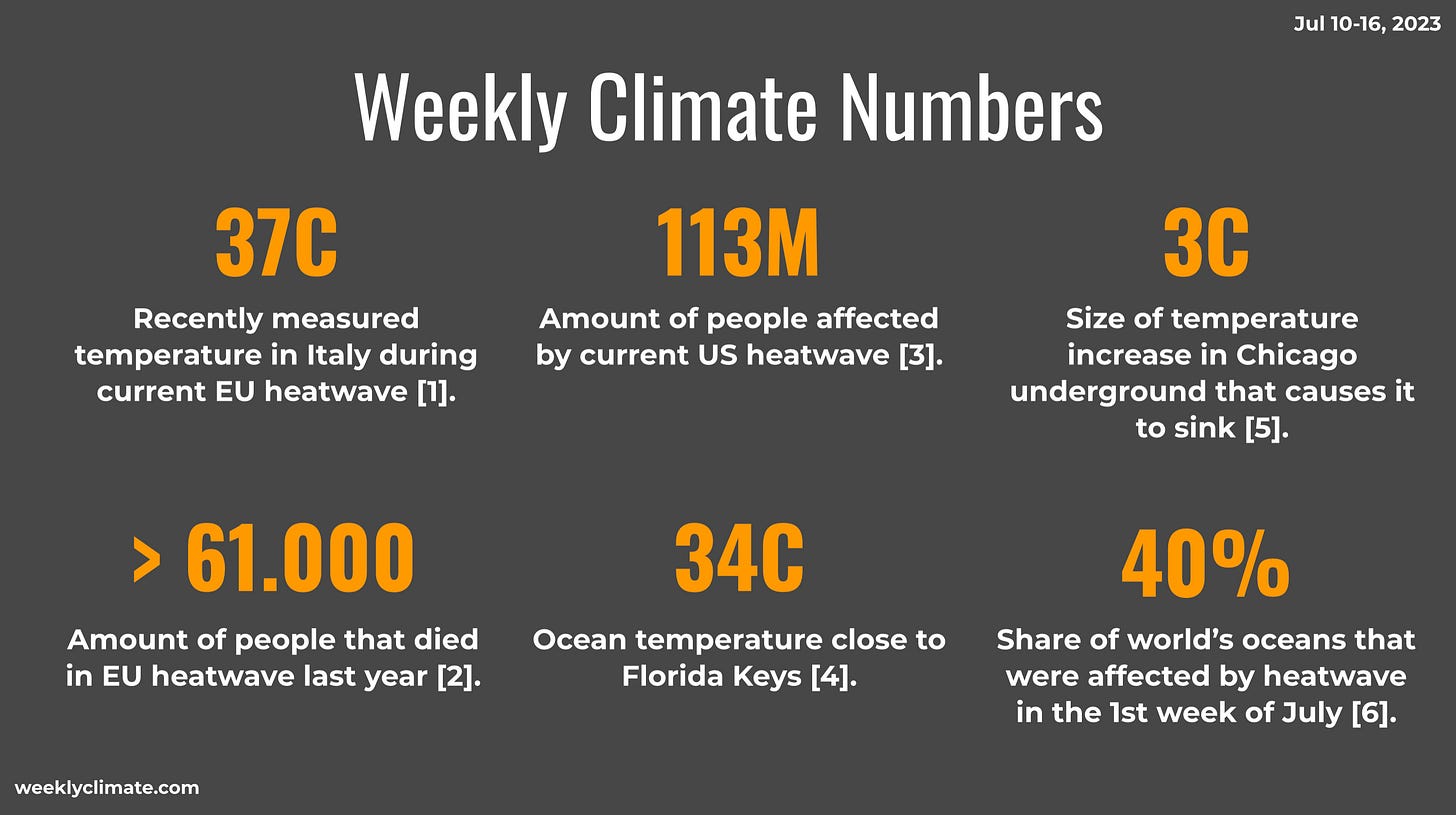THE BRIEF [July 10-16’23]
July week 1 likely hottest ever, renewables so cheap fossil peak might have been reached, droughts increase fossil fuel emissions and even tiny fossil gas leaks makes it worse than coal.
Welcome to this week’s edition of The Weekly Climate 🎉
References: [1], [2], [3], [4], [5] and [6].
If you’re only getting The Brief but want to get the full version of the newsletter be sure to upgrade your plan to paid. Check out the preview that you will receive to see why more than 30 people think it’s worth paying for. And see a recent week’s full newsletter for details for why I decided to go paid.
If you’re getting both: Thank you so much for deciding to upgrade to go paid 🙏. And thanks to everybody for reading my newsletter regardless of which version you read 🤗.
‼️News you can’t miss
Here’s one important scary/bad (🙀), good (😻), interesting (😼) and fossil (💩) news item.
🙀 1st week of July likely to be the hottest ever recorded
😻 Renewables are so cheap that fossil fuels might have peaked for electricity production
😼 New study finds that droughts increases fossil fuel emissions (due to lack of hydro)
💩 New study finds that even tiny leaks in fossil gas infrastructure can make fossil gas as bad as coal
This week’s highlights
[#fossilfuelpeak] — Renewable energy's exponential growth is driving down global electricity prices and making fossil fuels uneconomical, leading to a decline in gas, oil, and coal linked to electricity generation, according to a report by the Rocky Mountain Institute. The report predicts that solar panels and wind turbines will supply more than a third of global electricity by 2030, compared to about 12% today, with renewables producing as much as 14,000 terawatt-hours, overtaking fossil fuels. The increasing adaptation of clean-tech is set to halve its prices by 2030, falling to as low as $20 a megawatt-hour for solar from $40-plus now, the report said.
[#tribalism] — Here’s a gentle reminder that climate tribalism, or the tendency for climate activists to feud and tear each other's ideas apart, slows progress and helps deniers, oil companies, and anti-climate lobbyists. The answer to reducing carbon emissions is not to be choosy about solutions, but to use a combination of them. We need to be less fixated on the ideal pathway, more generous when dealing with rivals, and honest about what is and isn't true about solutions we don't like. We are all on the same team and need to start acting like it.
[#EUheatwave] — Europe is experiencing another heat wave, with temperatures reaching nearly 37 degrees Celsius in some parts of Italy. Experts say that Europe has failed to prepare for these heat waves, despite warnings nearly 20 years ago after a heat wave in 2003 left 70,000 people dead. Governments have missed carbon emission targets and failed to invest in tangible solutions. The modifications required for European cities to mitigate heat are daunting, and the burden has fallen on municipalities, which have limited resources and limited avenues for heat mitigation in ancient urban spaces. The cost of reducing the amount of carbon sent into the atmosphere from Europe is close to 260 billion dollars a year, and the annual cost of overheating will increase from 400 billion dollars to as much as 1.3 trillion by 2050.
[#USheatwave] — A massive heat wave in the US Southwest is expected to intensify, with over 113 million people suffering under extreme heat and California's Death Valley nearing its all-time-record temperature of over 54 degrees Celsius. The real danger of the heat wave will be its duration, lasting at least another week and causing disastrous impacts on human health, especially for outdoor workers and vulnerable populations. The urban heat island effect in big cities like Phoenix exacerbates the situation, making it difficult for people to avoid exposure to life-threatening heat stroke.
That’s it for this week folks!
If you want more details or simply think my newsletter rocks remember that you can always go paid to get the full version of the Weekly Climate. But before you do, ask yourself this question: Does it provide you with 1.25$ worth of value every week? Obviously I think it does. In fact I really hope that just the time alone I save you should easily cover those 1.25$. Don’t hesitate to ping me on michael@weeklyclimate.com or comment below with any questions, feedback or comments regarding this.
Remember if you’re feeling down, angry or sad from some of the news in this newsletter one cure is to act. And one way you can always act that also happens to be one of the most powerful things you can do is to talk about it. That also works if what you just read made you hopeful or happy btw.
If you enjoyed this newsletter don’t forget to share it with your friends, coworkers or other people you think could benefit from getting it. If you got directed here by a friend or another link on the Internet don’t forget to subscribe!
See you all next week 👋


